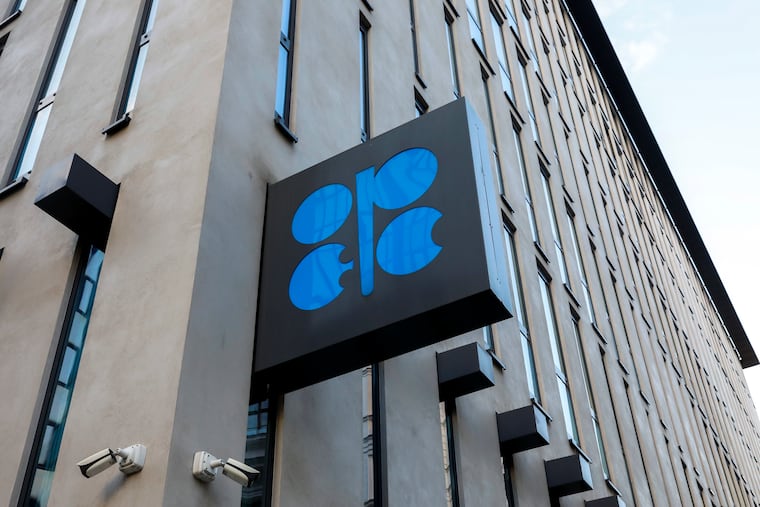OPEC+ makes big oil cut to boost prices; pump costs may rise
The OPEC+ alliance of oil-exporting countries has decided to sharply cut production to support sagging oil prices. The move could hit the struggling global economy and raise prices in the U.S.

FRANKFURT, Germany — The OPEC+ alliance of oil-exporting countries decided Wednesday to sharply cut production to support sagging oil prices, a move that could deal the struggling global economy another blow and raise politically sensitive pump prices for U.S. drivers just ahead of key national elections.
Energy ministers cut production by a larger-than-expected 2 million barrels per day starting in November after gathering for their first face-to-face meeting at the Vienna headquarters of the OPEC oil cartel since the start of the COVID-19 pandemic.
The group said the decision was based on the “uncertainty that surrounds the global economic and oil market outlooks.” Saudi Energy Minister Abdulaziz bin Salman stressed the group’s stated role as a guardian of stable energy markets.
“We are here to stay as a moderating force, to bring about stability,” he told reporters.
Oil is trading well below its summer peaks because of fears that major global economies such as the U.S. or Europe will sink into recession due to high inflation, rising interest rates and energy uncertainty over Russia’s war in Ukraine. The OPEC+ decision could help member Russia weather a looming European ban on most of Moscow’s oil, but its impact will have some limitations because countries in the alliance already can’t meet their quotas.
U.S. President Joe Biden considered the OPEC+ decision “short-sighted while the global economy is dealing with the continued negative impact of (Russian President Vladimir) Putin’s invasion of Ukraine,” White House press secretary Karine Jean-Pierre told reporters aboard Air Force One.
“It’s clear that OPEC+ is aligning with Russia with today’s announcement,” she said.
Bin Salman rejected questions referencing the reaction in Washington or implying that OPEC was assisting Russia, saying the discussion was in a nonpolitical “silo” where the focus was prudent management of oil markets.
Following a token trim last month, Wednesday’s decision is an abrupt turnaround from months of restoring deep cuts made during the depths of the pandemic. As demand rebounded, global energy prices have swung wildly since Russia invaded Ukraine, helping fuel inflation that is squeezing economies worldwide.
Part of the OPEC+ cut is “on paper” because members already can’t supply enough oil to hit their allotments, said Gary Peach, oil markets analyst at energy information firm Energy Intelligence. “Only about half of that is real barrels,” he said.
A cut with oil near $90, which is “a comfortable price for all producers,” might not sit well with customers, but the oil ministers are “looking into the tunnel of recession " that could lower demand in coming months, Peach said. “They decided to pre-empt that.”
The recent fall in oil prices has been a boon to U.S. drivers, who saw lower gasoline prices at the pump before costs recently started ticking up, and for Biden as his Democratic Party gears up for congressional elections next month.
Biden has tried to receive credit for gasoline prices falling from their average June peak of $5.02 — with administration officials highlighting a late March announcement that a million barrels a day would be released from the strategic reserve for six months. High inflation is a fundamental drag on Biden’s approval and has dampened Democrats’ chances in the midterm elections.
Oil supply could face further cutbacks in coming months when a European ban on most Russian imports takes effect in December. A separate move by the U.S. and other members of the Group of Seven wealthy democracies to impose a price cap on Russian oil could reduce supply if Russia retaliates by refusing to ship to countries and companies that observe the cap.
The EU agreed Wednesday on new sanctions that are expected to include a price cap on Russian oil, meant to starve Putin’s country of money for its war machine. It comes amid an energy crisis created by Russian reductions in natural gas supplies to Europe, whose leaders accuse Moscow of retaliation for their support for Ukraine and imposing of sanctions.
Russia “will need to find new buyers for its oil when the EU embargo comes into force in early December and will presumably have to make further price concessions to do so,” analysts at Commerzbank said. “Higher prices beforehand — boosted by production cuts elsewhere — would therefore doubtless be very welcome.”
International benchmark Brent has sagged as low as $84 in recent days after spending most of the summer months over $100 per barrel. U.S. crude rose to $87.64, and international benchmark Brent went up to $93.21 after the decision.